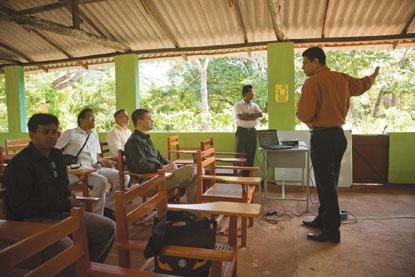Cooperatives Supporting Cooperatives

Leading U.S. food cooperative manufacturers continue to support producer co-ops in other nations. Following are two examples.
Once Again Nut Butter supports Nicaraguan farmers
Once Again Nut Butter, a U.S. manufacturer of nut butters, seed butters, and honey, exemplifies U.S. businesses that are working to support fair trade as well as fair labor standards. Once Again, a worker-owned company based in Nunda, N.Y., was recently awarded Domestic Fair Labor Certification through Scientific Certification Standards (SCS).
Fair labor differs from fair trade in considering labor practices in the entire supply chain, from farmer to processor to manufacturer. Once Again underwent a three-year process to obtain Fair Labor Certification for its organic tahini, the culmination of 17 years of sesame sustainability project in Nicaragua supporting 11 co-ops and 2,000 farmers.
Once Again also will soon introduce a new organic fair-labor-certified product from Nicaragua, Jubilee Bee Honey. Sweet success for Nicaraguan honey worker co-ops is a result of Once Again’s longstanding work with the charity, Jubilee House, to establish beekeeping farms there.
For more information contact Gael Orr, Once Again Nut Butter communications manager (gorr@onceagainnutbutter.com).
Frontier Co-op supports Sri Lankan farmers
In Sri Lanka, a 2,043-member cooperative of small-scale, organic farmers has had its own training center since late 2010, aided by Frontier Natural Products Co-op, a leading U.S. source of organic herbs, spices, and teas. The Small Organic Farmers Association (SOFA) is conducting classes for its member farmers on sustainable cropping techniques, erosion control, rain harvesting, and natural pest management.
As part of its Well Earth program for sustainable and ethical sourcing, Frontier donated $25,000 to help build the capacity of SOFA. Frontier Organic Purchasing Manager Kai Stark recently visited the new training center, which has already conducted training classes for more than 120 farmers.
"By helping to provide training on organic and sustainable agriculture practices," said Stark, "we are enabling the farmers to more efficiently and effectively grow their crops and to increase their incomes."
During 2010, SOFA earned a total of $150,000 in fair trade social premiums. In communities where farmers typically earn $900 to $1,200 annually, these premiums have funded scholarships and education programs, as well as the construction of clean water sources, schools, and a vast array of other beneficial community projects.
SOFA also depends on volunteers among its member farmers. Mahinda Karunarathna, the father of two children, is a typical SOFA member. Mr. Karunarathna grows pepper, cinnamon, cloves, nutmeg, ginger, and other spices on just a few acres of mountainous land. He also tends a rice paddy and keeps chickens to feed his family, while also making time to share his experience in sustainable farming methods as one of the trainers at the SOFA facility.







